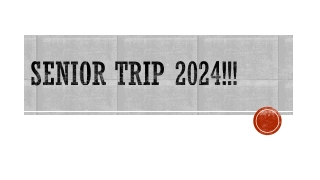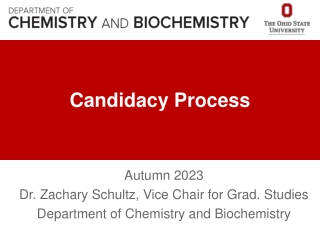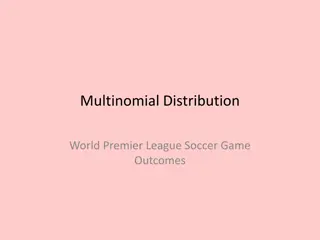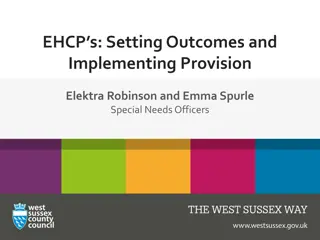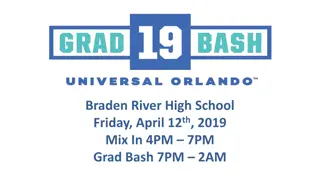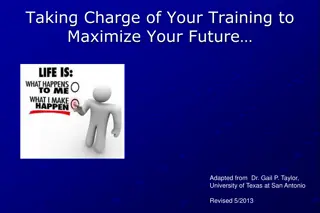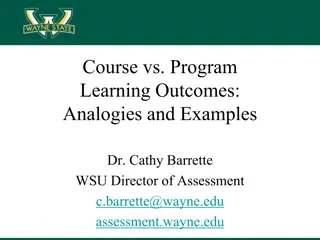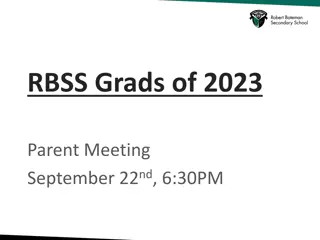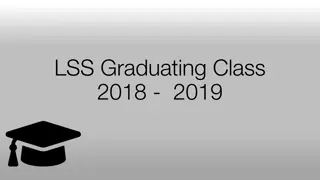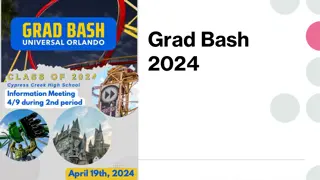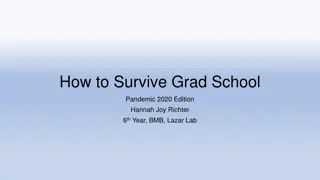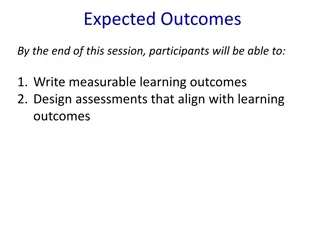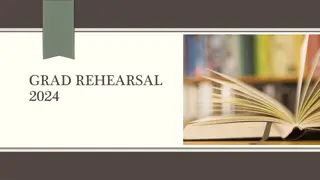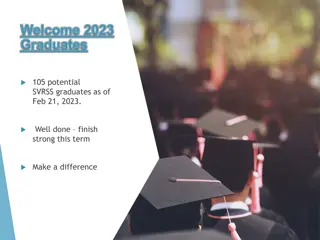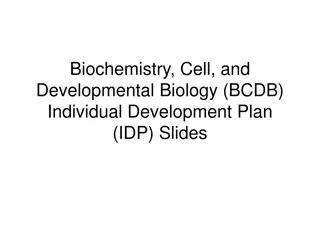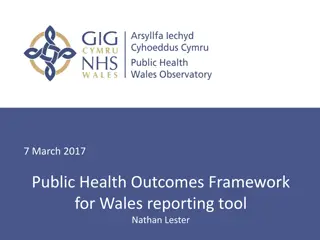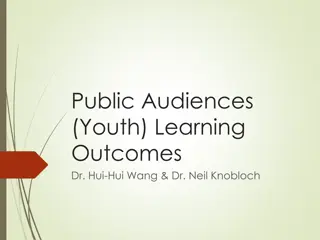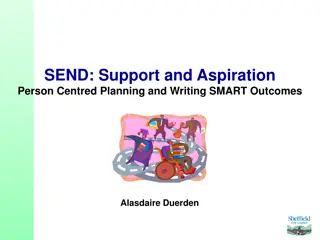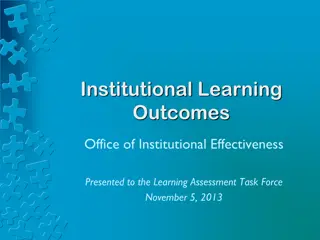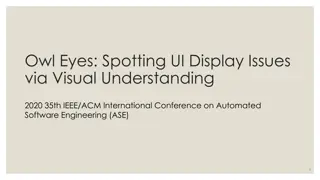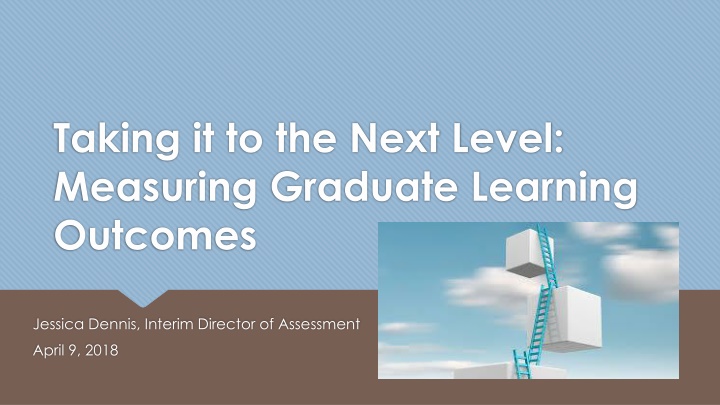
Enhancing Graduate Learning Outcomes Through Assessment Strategies
This presentation explores the significance of assessment in improving graduate learning outcomes, emphasizing key workshop goals, the importance of assessment, the assessment cycle, articulating graduate learning outcomes, and differentiating between undergraduate and graduate expectations using Bloom's Taxonomy and proposed graduate outcomes by Cal State LA. The content highlights the value of data-driven evidence for program enhancement and accreditation.
Download Presentation

Please find below an Image/Link to download the presentation.
The content on the website is provided AS IS for your information and personal use only. It may not be sold, licensed, or shared on other websites without obtaining consent from the author. If you encounter any issues during the download, it is possible that the publisher has removed the file from their server.
You are allowed to download the files provided on this website for personal or commercial use, subject to the condition that they are used lawfully. All files are the property of their respective owners.
The content on the website is provided AS IS for your information and personal use only. It may not be sold, licensed, or shared on other websites without obtaining consent from the author.
E N D
Presentation Transcript
Taking it to the Next Level: Measuring Graduate Learning Outcomes Jessica Dennis, Interim Director of Assessment April 9, 2018
Workshop Learning Goals By the end of this workshop participants will be able to: Differentiate between undergraduate and graduate Program Learning Outcomes. Select a variety of indirect and direct assessment measures to assess graduate outcomes. Formulate a graduate program assessment plan.
Why is assessment important? Improve student learning and success Provide faculty and students with useful information about student learning and progress Data-driven culture of evidence instead of anecdotes and opinions to inform curriculum revision Communicate the value of the program to our students and the public Program review and WASC Accreditation
Articulating Graduate Learning Outcomes
Differentiating Undergraduate and Graduate Expectations See Chancellor s Office Definitions of Graduate Instruction in the CSU. The graduate course deals with more complex ideas, materials, techniques or problems than the undergraduate course, and demands searching and exhaustive analysis. The graduate course requires: The identification and investigation of theory or principle. The application of theory to new ideas, problems, and materials. Extensive use of bibliographic and other resource materials with emphasis on primary sources of data. Demonstration of competence in the scholarly presentation of the results of independent study. Satisfactory completion of a graduate course requires more creative thinking than an upper division course.
Blooms Taxonomy
Graduate Learning Outcomes Proposed by Cal State LA Graduate Subcommittee (tentative, not approved by Senate) Specialized Knowledge Articulates the major theories, research methods, and approaches to inquiry and schools of practice in the field of study; evaluates their sources and illustrates their applications through projects, papers, exhibits, or performances. Broad, Integrative Knowledge Investigates how the field of study has developed in relation to other major domains of inquiry and practice; and assesses the implications of the resulting advantages, challenges, and trends in a social or global context. Intellectual Skills: Critiques and synthesizes the assumptions, conventions, and diverse perspectives appropriate to the field of study. (Analytical Inquiry) Frames and examines a controversy or problem via research, project, paper, or performance in the field of study. (Analytical Inquiry) Applies, articulates, and challenges traditions, assumptions, or prevailing practices in the field of study using ethical reasoning in the discipline. (Ethical Reasoning) Critically examines the power and limitations of quantitative evidence in the evaluation, construction, and communication of arguments, in their field of study. (Quantitative Fluency) Demonstrates communicative fluency and information literacy appropriate to their field of study through skillful translation across multiple expressive modes, such as oral, written, or digital forms of communication. (Quantitative Fluency) Civic and Global Learning Articulates or demonstrates how advancing knowledge in their field of study contributes to the public good.
Degree Specification using the DQP The Degree Qualifications Profile (DQP) outlines a set of reference points for what students should know and be able to do upon completion of associate, bachelor s and master s degrees in any field of study. There are five broad categories of proficiencies which provide a profile of what degrees mean in terms of specific learning outcomes. Through focusing on broad areas of learning and the application of that learning, the DQP illustrates progressively challenging performance expectations for all students.
Using the DQP for Tuning Tuning is the collaborative process of coming together to define core competencies expected of students studying a particular discipline Activity #1: Look at the degree specification rubrics and worksheet. How can you use these help you to differentiate expectations for the Bachelor s and Master s degrees? How could you involve the other faculty in the tuning process?
Indirect Methods of Assessment Graduation or completion rates Placement rates Student, employer, alumni, and faculty surveys Student focus groups Exit (end of program) survey or interviews Reflection essays Self-ratings Diaries or journals Data from institutional surveys (NSSE) Curriculum/syllabus analysis Checklists
Direct Methods of Assessment Off-campus professional presentations (for clients, agencies, etc.) Case studies Artistic performances, recitals, & products Field evaluations (supervisor or instructor) Published (standardized) test (e.g., Major Field Test) Capstone products, theses, dissertations Comprehensive exams Pass rates on certification or licensure exams Oral exams or competency interviews Portfolios
Direct Methods of Assessment: Class-based Term papers or projects Oral or poster presentations Simulations Embedded questions in course exams
Assessing the Culminating Experience
Using Rubrics for Direct Assessment of Learning Outcomes Why use rubrics? Chance for faculty to explicitly articulate and specify criteria for evaluating student learning Student work can be scored to examine for which skills are they meeting expectations and which need improvement
Exercise #2: Assessing Graduate Outcomes in the Culminating Experience For culminating experience options: What are the learning outcomes measured? On what basis is it decided if performance is satisfactory? Do faculty (outside of the committee) regularly discuss student performance? How could you use a rubric to aid in the assessment of student performance? If you already use a rubric, how could the rubric or procedure be improved upon?
Formative vs. Summative Assessment Formative assessment: takes place during the learning process gauges student progress allows for modification of teaching and learning activities e.g., quizzes, field ratings, student reflections Summative assessment: evaluate student learning at the end of an instructional unit compares student performance against some standard or benchmark tend to be high stakes e.g., papers, exams, projects
Combining Formative and Summative Assessment in Graduate Programs Assessing outcomes only at the culminating experience doesn t allow students and faculty to monitor progress Are there transition points within the program (e.g., admission, completion, completion of a field experience) that lend themselves to assessing student learning? Faculty, students, field supervisors, etc. can all play a role in providing useful assessment and feedback
Example- Assessment of Dispositions in CCOE s Los Angeles Urban Teaching Residency Program (LAUTR) RT360 Formative Framework Integrates 360 degrees of dispositional data from online surveys into systematic reflection between residents and support providers about strengths, needs, areas for improvement, and action plan generation Culminates in two-levels of facilitated debrief meetings (Residents and LAUTR Faculty and Staff) Generates actionable goals for resident growth Actionable plans for growth implemented collaboratively by residents and mentors in the field
Dispositions Assessed with RT360 Professionalism TPE 6* Basics for Success 1) Communication 2) Organization, Planning, and Punctuality 3) Tact & Judgment 4) Reliability, Persistence 5) Self-Initiative, Independence, Responsibility Interpersonal Skills 1) Interaction 2) Collaboration & Collegiality 3) Feedback: Receiving & Soliciting Values & Advocacy 1) For Learning 2) For Diversity & Social Justice 3) For Community Role Reflecting 1) On Teaching & Learning 31
Sampling of RT360 Items Diversity and Social Justice 14-1 - Demonstrated unbiased treatment of students 14-2 - Honored and acknowledged diversity among students 14-3 - Effectively built upon students' backgrounds 14-4 - Views diversity as an asset which enhances student knowledge
Sample Open-Ended Responses Resident It took me some time to get to know the students, their backgrounds and interests. I have some good ideas as to how can incorporate social justice themes into my teaching though I didn't always feel comfortable doing so. There were some aspects of the content material that I struggled with connecting to social justice themes (e.g. photosynthesis and cellular respiration). Mentor The Resident has participated in several Restorative Justice Circles. S/he greets students on a daily basis. S/he will ask students how they are doing. Supervisor S/He has articulated that he desires to have more opportunities to engage in social justice work within the classroom and is finding the right opportunities to express this desire with his mentor.
Curriculum Mapping PLO 4950 4910 5040 5150 or 5910 Elective 1 Elective 2 Elective 3 Elective 4 1 Knowl I I P/D P/D M M 2 Skills I P/D M 3 Comm I I P/D M P/D P/D M M 4 Prof I M P/D Identify which PLOs will be Introduced (I), Practiced/Developed (P/D), and Mastered (M) across the curriculum
Assessment across the Curriculum PLO 4950 4910 5040 5150 or 5910 Elective 1 Elective 2 Elective 3 Elective 4 1 Knowl I M 2 Skills I P/D M 3 Comm I P/D M 4 Prof I M Identify where you will collect assessment evidence for analysis at the program-level
Gathering Evidence in Multiple Courses Student Assignments Assignments Assignments Assignments Assignments Student Assignments Assignments Assignments Assignments Assignments Grade to students Student Assignments Assignments Assignments Assignments Assignments Student Student Student Student Student Student Student Student Student Student Student Student Grade to students Grade to students Course #3 Instructor Course #2 Instructor Course #1 Instructor Team of Faculty Score Assignments Course Instructor(s) Score Assignments or Assessment Coordinator or Committee Compile Results Program Faculty Reflect on Results
Assessment Resources National Institute for Learning Outcomes Assessment (NILOA) Degree Qualifications Profile (DQP) Association of American Colleges and Universities (AAC&U) VALUE rubrics Intellectual and Practical Skills, including Inquiry and analysis Critical thinking, creative thinking Written communication, oral communication Quantitative literacy, information literacy Teamwork, problem solving Personal and Social Responsibility, including Civic knowledge and engagement local and global Intercultural knowledge and competence Ethical reasoning and action Foundations and skills for lifelong learning
Exercise #3: Assessing at Transition Points Are there transition points within the program (e.g. admission, completion, completion of a field experience) that lend themselves to assessing student learning? Does your program have a practical field experience component? If so, what is the purpose of that component? How can assessment take place in those experiences?
Comprehensive Assessment Plan PLOCourse(s) where PLO is assessed Assessment activity/ assignment used to measure PLO Assessment tool used to measure outcome success Criteria/ben chmark Assessmen t schedule how often SLOs will be assessed Designated personnel to collect, analyze, and interpret student learning outcome data Program data/ findings dissemination plan Possible actions based on results Oral pres., written exam, essay, etc. Rubric or other scoring system Specify benchmark performanc e for students in program Collect in classes & analyze every other year, etc. Committee, instructors, etc. How will the results be shared/discus sed? What actions could results inform?
Example: Engineering Program dissemination plan Possible actions Assessment Tool Benchmar k Schedul e PLO Course Activity Personnel B1. Ability to effectively collect and present data ME 5150 (Therma l Lab) Rubrics in lab report Spring 1st year Lab report Instructor B2. Ability to clearly analyze and interpret results ME 5060 (Heat Transfer) Rubrics in lab report Spring 1st year Lab report Instructor Changes in courses, increased opportunities for practice, feedback to students, etc. Committee compiles results and presents at fall faculty meeting B3. Ability to develop a proper testing and/or data collection process as appropriate to the project. 90% meet or exceed standard ME 5972 (Design II) Spring 2nd year Instructor and faculty advisor Final Project Report Rubrics in project report B4. Ability to design and conduct experiments and/or data analysis to verify design analysis. Rubrics in design presentation survey ME 5972 (Design II) Project presentatio n Spring 2nd year Instructor and faculty advisor
Closing the Loop: Strategies for Effective Use of Assessment Results Present results at department meetings or retreats to stimulating faculty discussion on student learning and pedagogy You might also: Present results to student groups or within key classes to engage students in their own learning Report results on the website to demonstrate student achievement or raise awareness of learning goals Seek input from alumni or employers to improve practices
Next Steps What have you learned today that you want to share with others in your department? Write down 1-3 you can do this semester to keep your assessment momentum going?

